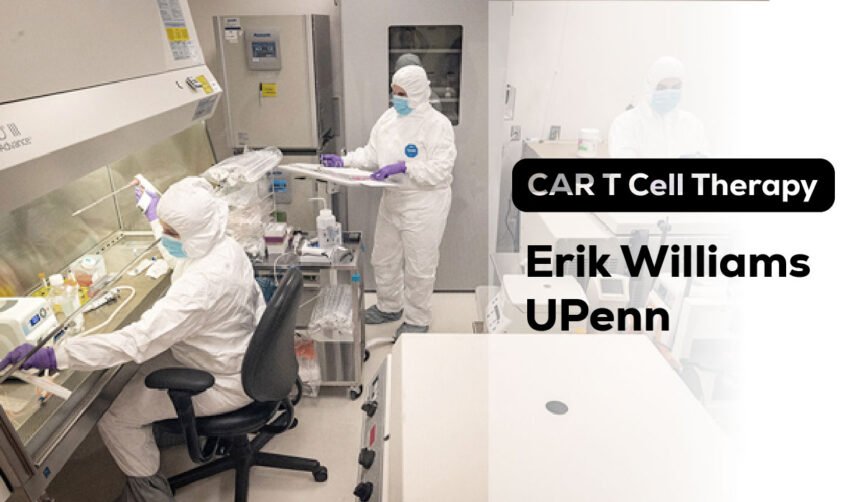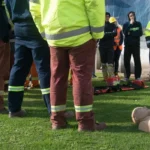Erik Williams, a diligent Ph.D. student at the University of Pennsylvania’s Perelman School of Medicine, is spearheading revolutionary advances in the field of cancer immunotherapy. His trailblazing research in CAR T cell therapy stands poised to redefine the landscape of cancer treatment. Under the mentorship of Dr. Joseph Fraietta, a leading figure in immunology, Erik’s work focuses on leveraging cutting-edge synthetic biology and genetic engineering techniques to enhance the efficacy and safety of this innovative treatment. His pioneering efforts are not just academic; they hold the promise of real-world implications, potentially transforming patient outcomes and setting new standards in medical care.
Personal details about Erik Williams
| Detail | Description |
|---|---|
| Name | Erik Williams |
| Role | Ph.D. Student |
| Institution | University of Pennsylvania’s Perelman School of Medicine |
| Field of Study | Cancer Immunotherapy |
| Research Focus | CAR T cell therapy, synthetic biology, genetic engineering using CRISPR/Cas9 technology |
| Mentor | Dr. Joseph Fraietta |
| Key Interests | Enhancing the efficacy and safety of CAR T cell therapy, overcoming resistance in cancer treatment |
| Achievements | Pioneering research in modifying T cells for improved cancer treatment outcomes |
| Goals | To develop safer, more effective cancer therapies and expand the use of CAR T cell therapy to solid tumors |
| Impact | Potential transformation of cancer treatment practices and improved patient outcomes |
Background of Erik Williams
Erik Williams embarked on his academic journey with a profound interest in the life sciences, culminating in his pursuit of a Ph.D. at UPenn. His choice to focus on CAR T cell therapy stemmed from a personal motivation to contribute to tangible, impactful solutions in the fight against cancer. At UPenn, Erik found an environment ripe for innovation and collaboration, allowing him to dive deep into the complex mechanisms of immune response and cellular engineering.
Understanding CAR T Cell Therapy
CAR T cell therapy, a groundbreaking approach in cancer treatment, involves modifying a patient’s T cells to better recognize and combat cancer cells. This therapy has shown exceptional promise in treating certain types of leukemia and lymphoma, marking a significant departure from traditional cancer treatments like chemotherapy and radiation. Erik’s role in this domain involves refining the therapy to address its current limitations, such as the potential for severe side effects and the complexity of manufacturing.
Synthetic Biology’s Role in Enhancing CAR T Cells
One of Erik’s key research areas is the application of synthetic biology to create CAR T cells that are not only more potent but also more controllable. By engineering synthetic receptors that can be fine-tuned according to therapeutic needs, Erik is helping to pioneer developments that could lead to safer, more effective treatments. This aspect of his research signifies a major step forward in making CAR T cell therapy a viable option for a broader range of cancers.
CRISPR/Cas9: Revolutionizing Genetic Engineering
The integration of CRISPR/Cas9 technology into Erik’s research has been transformative. By allowing for precise, targeted edits to the genetic material of T cells, Erik is able to enhance their cancer-fighting capabilities without compromising their normal functions. This precise gene editing is crucial for minimizing the risks of therapy-related side effects, making the treatment safer for patients.
Tackling Cancer Resistance through Epigenetic Modulation
A significant portion of Erik’s research also focuses on the epigenetic modulation of T cells. Understanding and manipulating the epigenetic landscape of these cells is key to overcoming one of the major hurdles in CAR T cell therapy: cancer resistance. By identifying specific genes that can be modulated to prevent or overcome resistance, Erik’s work is paving the way for more robust and durable cancer therapies.
The Promise of Biomarkers in Personalized Treatment
In his pursuit of personalized medicine, Erik is investigating biomarkers that could predict how well a patient might respond to CAR T cell therapy. This research is crucial for the development of tailored treatment plans that maximize efficacy while minimizing unnecessary exposure to potentially harmful therapies.
Expanding the Scope to Solid Tumors
While CAR T cell therapy has provided remarkable results in the treatment of hematologic cancers, its application in solid tumors presents additional challenges, such as the tumor microenvironment’s complexity. Erik’s ongoing research aims to adapt CAR T cell strategies to overcome these barriers, extending the benefits of this promising therapy to more cancer patients.
Collaborative Research and Clinical Trials
Collaboration is a cornerstone of Erik’s approach. By working alongside other researchers and participating in clinical trials, he is able to translate his laboratory findings into clinical applications that could one day lead to new standards in cancer treatment. These trials are critical for evaluating the safety and effectiveness of new therapies, helping to ensure that they provide real benefits to patients.
Conclusion: Erik Williams UPenn
Erik Williams’ contributions to the field of CAR T cell therapy at the University of Pennsylvania are setting new benchmarks in cancer research. His innovative work in synthetic biology, genetic engineering, and epigenetic modulation is not just advancing our understanding of how to fight cancer but also providing hope for more effective and personalized treatments in the future. As Erik continues to push the boundaries of medical science, his research holds the potential to significantly improve the lives of cancer patients worldwide, heralding a new era of treatment that is both more effective and less invasive.
FAQs About Erik Williams and His Research at UPenn
1. Who is Erik Williams?
Erik Williams is a Ph.D. student at the University of Pennsylvania’s Perelman School of Medicine, where he is conducting pioneering research in the field of cancer immunotherapy, specifically focusing on CAR T cell therapy.
2. What is CAR T cell therapy?
CAR T cell therapy is a form of immunotherapy that involves altering a patient’s T cells (a type of immune cell) in the laboratory to help them attack cancer cells more effectively. These modified T cells are then infused back into the patient’s body.
3. What specific area of CAR T cell therapy does Erik Williams focus on?
Erik Williams specializes in enhancing the efficacy and safety of CAR T cell therapy through the use of synthetic biology and genetic engineering, including the revolutionary CRISPR/Cas9 technology.
4. How does CRISPR/Cas9 technology benefit Erik Williams’ research?
CRISPR/Cas9 technology allows Erik to make precise edits to the DNA of T cells, improving their ability to recognize and kill cancer cells while reducing potential side effects, making the therapy safer and more effective.
5. What are the potential benefits of Erik Williams’ research for cancer patients?
Erik’s research aims to develop more effective and safer CAR T cell therapies that could lead to better treatment outcomes, fewer side effects, and potentially expanded use of this therapy for different types of cancer, including solid tumors.
6. What challenges does Erik Williams aim to overcome in his research?
Erik is working to overcome several challenges associated with CAR T cell therapy, including reducing the therapy’s toxicity, enhancing its effectiveness against solid tumors, and overcoming cancer cell resistance.
7. How is synthetic biology used in Erik Williams’ research?
In his research, synthetic biology is used to engineer T cells with synthetic receptors that can be controlled more precisely, enhancing the safety and effectiveness of the therapy.
8. What role do biomarkers play in Erik Williams’ research?
Erik is studying biomarkers to predict which patients will respond best to CAR T cell therapy, which helps personalize treatment and ensure that patients receive the most appropriate and effective therapy.
9. Has Erik Williams published any research papers?
While specific details of his publications are not provided here, as a Ph.D. student involved in cutting-edge research, Erik likely contributes to scholarly articles in the field of immunotherapy and synthetic biology.
10. How can Erik Williams’ research impact the future of cancer treatment?
Erik’s research could significantly impact the future of cancer treatment by developing new methods and technologies that make CAR T cell therapy more effective, safer, and applicable to a wider range of cancers. This could transform how cancer is treated and increase the survival and quality of life for patients worldwide.








